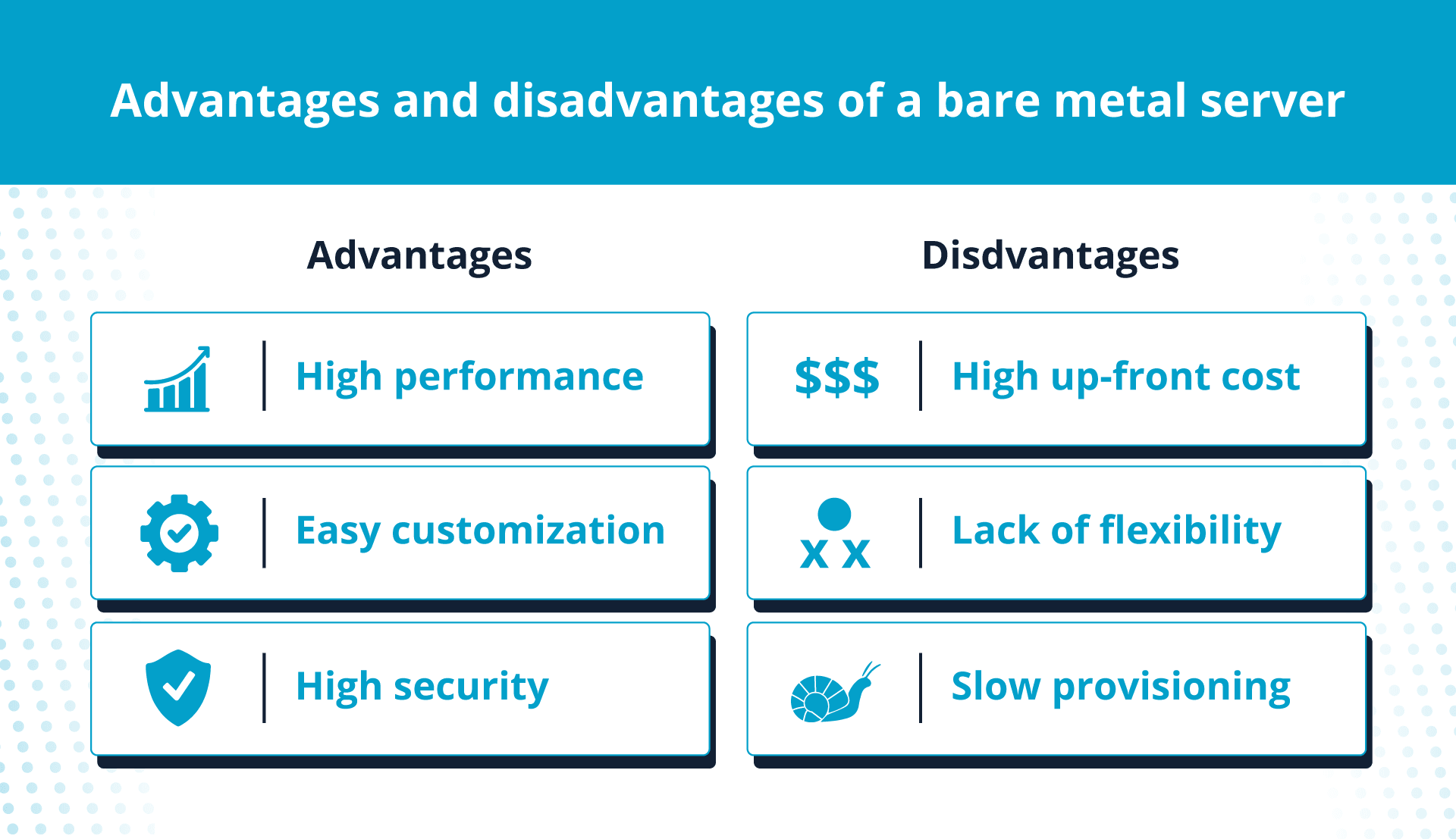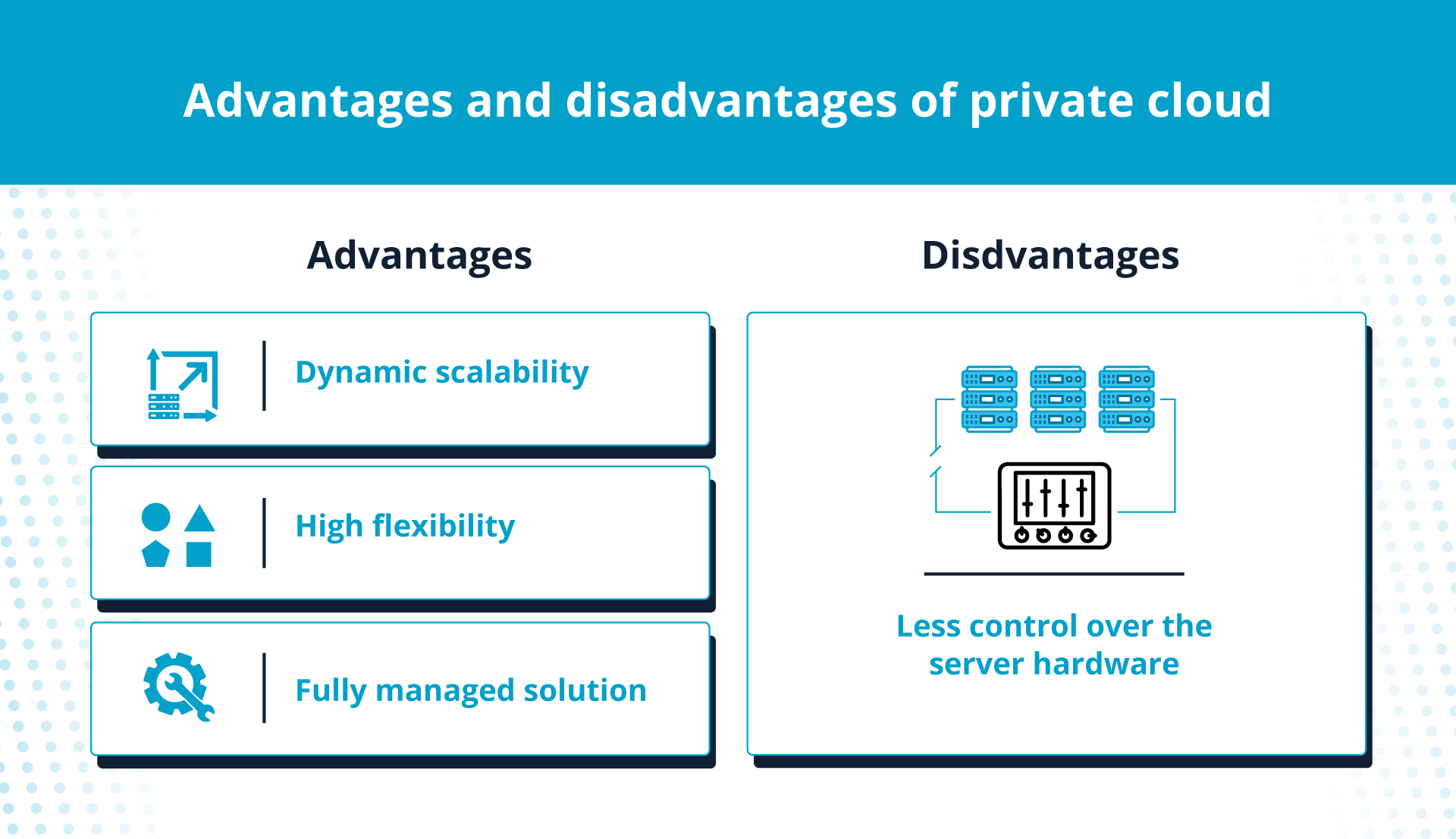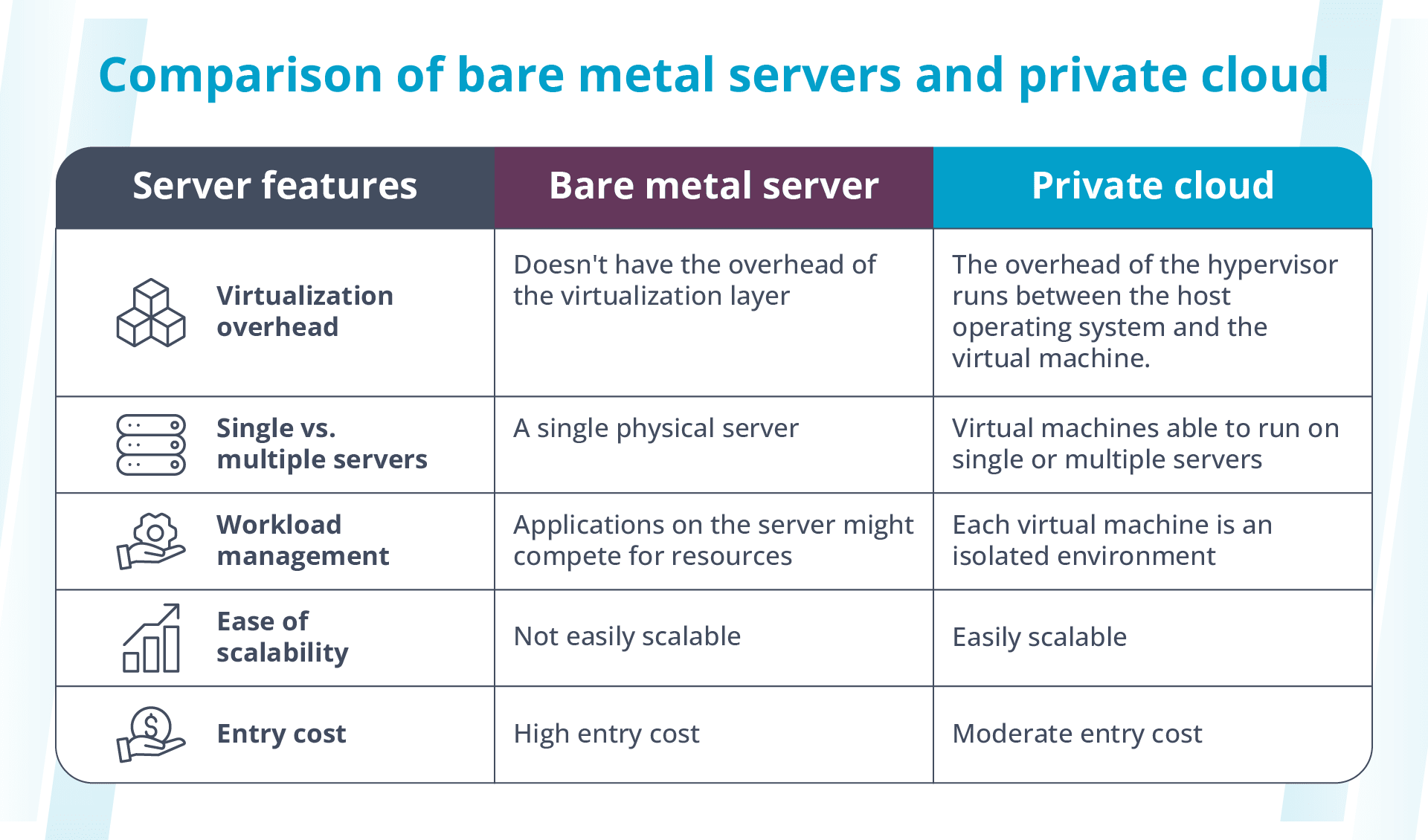Bare metal vs private cloud: Which hosting infrastructure should you choose for your business?
Where you host your data and applications can make or break your business. So, you must choose a hosting infrastructure that suits your business’s specific needs. The hosting solution must offer high performance and availability while supporting your enterprise software.
Bare metal and private cloud are two hosting options that offer performance and security. Hosting service providers offer bare metal and private cloud as Infrastructure-as-a-Service (IaaS). But how do you determine which solution best suits your business?
In this article, we’ll explore the question of bare metal vs. private cloud in detail, compare their advantages and disadvantages, and see how to choose between them.
Key points
- are metal servers are dedicated physical servers. They’re high-performing machines that ensure the security of your enterprise applications.
- A private cloud is a single-tenant cloud environment alternative to bare metal servers.
- The benefits of a bare metal server include security, performance, and customizability. A private cloud has the added advantage of scalability and elasticity.
- Choosing between bare metal vs. private cloud depends on your business’s flexibility, scalability requirements, and budget.
Let’s look closer at bare metal servers and private cloud environments. Here are the points we’ll cover:
- What is a bare metal server?
- What is a private cloud?
- Advantages of a bare metal server
- Disadvantages of a bare metal server
- Advantages of private cloud
- Disadvantages of private cloud
- Differences between a bare metal server and private cloud
- How to choose between a bare metal server and private cloud
- Final thoughts: Bare metal vs. private cloud: How do they differ?
What is a bare metal server?
A bare metal server is a physical server dedicated to a single tenant or client. It could be on-premises or in a colocation facility, such as a service provider’s data center.
The single tenant has access to all of the bare metal server’s computing resources, bandwidth, and storage. In a bare metal server, the operating system is directly installed on the server’s hard disk, meaning there isn’t a virtualization layer.
What is a private cloud?
Before we get into the nitty-gritty of what a private cloud is, let’s go over how a cloud environment works in general.
A cloud environment has multiple virtual machines running on a single piece of hardware or multiple physical servers. Virtualization allows each virtual machine to share the resources of the underlying physical server.
In a cloud environment, the hypervisor software runs on top of the physical server’s operating system, allowing the creation of multiple virtual machines. Each virtual machine runs as an isolated environment with separate memory, storage, and operating system. Multiple virtual machines are connected over a virtual network infrastructure to form a cloud computing environment.
Private cloud is a type of cloud hosting environment dedicated to a single tenant. This tenant can decide how many virtual machines to run and what resources to allocate to each.
Liquid Web offers a private cloud that uses VMware’s virtualization technology. It provides security and performance similar to bare metal while allowing the flexibility and scalability of a cloud environment.
Advantages of a bare metal server

Every type of server has its strengths and weaknesses. It’s crucial to understand where bare metal shines and where it stumbles.
High performance
A bare metal server only has one tenant. This means that if you chose a bare metal server, you would get dedicated resources like:
- Random access memory (RAM).
- The central processing unit (CPU).
- Storage space.
- Network resources.
Since there is no shared usage, you won’t face the noisy neighbor issue when a cotenant hogs all the server’s resources. In other words, your workloads are guaranteed to get 100% of the resources you allocate to them.
Bare metal servers also have high-end specifications to support resource-intensive workloads, ensuring high availability and performance.
Easy customization
Bare metal infrastructure has dedicated servers, and you can design your hardware configurations from scratch. For example, you can control the speed and processing power of your bare metal server by customizing the following aspects:
- CPU speed.
- Number of cores.
- Operating system.
- Amount of storage.
You also have direct access to the server’s kernel — a piece of software at the core of an operating system — allowing you to make modifications and optimize your workloads. A bare metal server’s customizability ensures optimized resource utilization and cost reduction.
High security
Server security is a top concern for any business that handles its customers’ personal and financial information.
The United States has state-specific data protection rules, such as the California Consumer Privacy Act, the Colorado Privacy Act, and the Virginia Consumer Data Protection Act. Noncompliance with these rules could result in monetary fines and a loss of reputation.
If you operate worldwide, you must also adhere to region-specific data privacy rules, like the General Data Protection Regulation (GDPR) in the European Union.
Bare metal servers are more secure than a multi-tenant public cloud environment. Since you don’t share the computing environment with others, there is a smaller chance of a malicious attack from a cotenant.
A bare metal server also allows you root access to install security features like a firewall and malware protection and run security protocols like frequent virus scans. You can also restrict access to the physical machine, reducing the risk of unauthorized individuals coming into contact with it.
Disadvantages of a bare metal server
While bare metal servers provide excellent performance and security, they also have several disadvantages.
High up-front cost
Since bare metal servers offer single tenancy, you must lease or buy a whole server. Even the server with the lowest configuration may be much more than you need. This could result in unnecessary entry costs, especially if you are a startup in its growth stages.
Slow provisioning
Unlike a cloud infrastructure, where you can create virtual machines on the go, provisioning new bare metal servers is a slow process. If you have dynamic workloads and need to provision resources in real time, there might be better choices than bare metal servers.
Lack of flexibility
Once you’ve designed and configured a bare metal server, changing its hardware configuration won’t be easy. You’ll need technical knowledge to upscale a bare metal server, which takes time. Also, dynamic provisioning of new servers isn’t possible. You must acquire new servers, configure them, and install an operating system and tools before you can run your apps.
Advantages of private cloud

Like a bare metal server, private cloud provides dedicated resources and a secure, isolated environment for a single tenant. Private cloud also offers other benefits, which we’ll cover in more detail below.
Dynamic scalability
With a virtual private cloud, you can quickly provision resources to scale up to your requirements. You can dynamically add virtual machines to your fleet to prevent performance degradation when your applications face peak traffic.
Liquid Web’s private cloud plan is the perfect solution if you want to start with minimum resources and scale up your servers as your business grows. Our hosting plan offers horizontal scalability by adding additional web nodes with file replication and load sharing.
High flexibility
If you’re a small business planning to grow in the future, you might only have an estimate of how many machines you need. A private cloud allows you to start small and scale up as your business grows.
This flexibility makes private cloud a cost-effective way to kick-start your business. For example, Liquid Web provides a resource-based pricing model for its VMware-powered private cloud plan. Our plan lets you deploy as many VMware virtual machines as your hardware resources can support without additional fees.
Fully managed solution
Unlike a bare metal server, which requires technical expertise to design and deploy the hardware and software, private cloud plans can be fully managed, allowing you to get the most out of them without requiring advanced technical skills.
Liquid Web’s fully managed service includes the entire virtual data center management, including:
- Virtual machine management.
- Hardware management.
- Cloud platform management.
Disadvantages of private cloud
A private cloud combines the benefits of a secure bare metal server with the flexibility of a cloud environment. Nevertheless, this kind of infrastructure isn’t without drawbacks.
For example, the service provider determines your cloud servers' software and hardware options in a fully managed private cloud. This means you’ll have less control over the specifications of your resources.
That may sound like a bad thing, but it might be a blessing in disguise, especially considering the potential cost savings of letting the provider handle those aspects of the hosting environment.
Differences between a bare metal server and private cloud

A bare metal server is a single-tenant physical machine in a data center. The operating system and applications run on top of this hardware. A private cloud is a virtualized hosting environment that supports a single tenant and consists of multiple virtual machines.
Let’s compare these two solutions in detail so that you can choose the one most suitable for your business’s requirements.
Virtualization overhead: Unlike bare metal servers, the cloud server has a hypervisor layer between the hardware and operating system. The hypervisor is essential for virtualization but takes up the server’s resources, which means that using all of a cloud server’s resources isn’t possible.
Single vs. multiple servers: A bare metal server is a single tenant, physical server on the client’s premises or in a remote location. A private cloud can have multiple virtual machines that run on a single physical server or pool resources from multiple servers.
Workload management: In a bare metal server, apps run on a single machine and share the physical server’s resources. This setup can lead to resource contention, which occurs when one app hogs the server’s resources.
A private cloud allows you to create multiple isolated virtual machines. For example, you can make a virtual machine with high computing power to run critical workloads and use low-capacity machines for less important applications.
Ease of scalability:A tenant can build a bare metal server according to their needs. However, dynamic scaling up and down of resources isn’t easy once the server has been configured. With a private cloud, you can dynamically add more virtual machines to scale up as your needs change.
Entry cost: A bare metal server is a standalone machine, and you need to buy or lease a bare metal server as a whole. In contrast, you can choose a small cloud environment that suits your initial needs and provision more resources as your business grows.
How to choose between a bare metal server and private cloud
Bare metal servers and private cloud environments are secure, high-performing hosting options. Depending on your business’s needs, however, one of these solutions might work better for you than the other.
Choosing between bare metal and private cloud should be based on your business needs, like:
- Expected workload.
- Scalability requirements.
- Flexibility requirements.
- Budget.
Let’s take a closer look at these deciding factors.
Expected workload
A high-performing bare metal server is a good choice if your applications need high computing power. Keep in mind, though, that a bare metal server doesn’t offer much flexibility in terms of downscaling its resources.
If your applications aren’t resource-intensive, going for a high-capacity bare metal server might not be cost-effective. In that case, starting with a small-scale cloud environment and upscaling as your workloads become complex or require more resources makes sense.
Scalability requirement
Choosing a bare metal server with the correct specifications is a good idea if you have a resource-intensive yet predictable application load. But upscaling resources with a bare metal server takes time.
If you have a business with a fluctuating server load, like an eCommerce website or online streaming server, you need to be able to scale up and down quickly. In this case, private cloud would be a better option because of its flexible scalability.
For example, Liquid Web’s private cloud solution supports dynamic scaling, where you can commission and decommission virtual machines as you see fit.
Flexibility requirement
Ask yourself, How many machines do I need? If the answer is one, then a bare metal server should suffice. If you need more than one, however, a private cloud environment is a better option. The reason lies in the nature of how these two types of infrastructure work.
As we’ve discussed, a bare metal server is a single machine where an operating system runs directly on the hardware. All of your applications would run on top of this operating system.
A private cloud, in contrast, is a virtualized environment with multiple virtual machines that run on one or many physical servers. If you need separate servers, such as a machine to run an email or a database server, only a private cloud gives you the flexibility to create multiple virtual machines.
Budget
As we saw earlier, bare metal servers often have high processing power and superior configurations. These factors mean leasing or purchasing a bare metal server is expensive. If your business can estimate the processing power it needs and has the budget to meet up-front expenses, bare metal is a good option.
On the other hand, if you want to start at a lower budget and invest more as you grow, private cloud offers you a more economical plan.
Final thoughts: Bare metal vs. private cloud: How do they differ?
Bare metal and private cloud are secure, high-performing, single-tenant hosting solutions for enterprise businesses.
A bare metal server gives you complete control over your IT infrastructure. It’s suitable for businesses with predictable, resource-intensive workloads. A private cloud, in contrast, allows enterprises to scale their resources as they see fit; therefore, it’s ideal for agile businesses with fluctuating workloads.
If you’ve decided that your business needs a fully managed private cloud solution, look no further than Liquid Web. Reliable, secure, and scalable, our VMware-powered private cloud plan is the perfect choice for enterprises looking for cost-effective and fully managed infrastructure.
Contact our team of experts today to learn more.
Related Resources
Keep up to date with the latest Hosting news.



